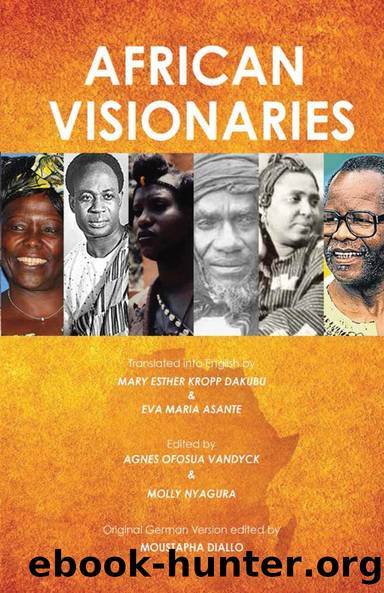African Visionaries by Kropp Dakubu Maria Asante

Author:Kropp Dakubu, Maria Asante [Kropp Dakubu, Maria Asante]
Language: eng
Format: epub
Tags: Nonfiction, History, Africa
ISBN: 9789988308841
Publisher: Sub-Saharan Publishers
Published: 2019-01-10T05:00:00+00:00
Bibliography
Henriette Diabaté: Aniaba, un Assinien à la cour de Louis XIV. Paris 1975.
Chapter 24
ABRAHAM P. HANNIBAL (Eritrea/Russia)
AGAINST ALL ODDS
BY ISSAYAS TESFAMARIAM
On November the 28th, 2009, a monument was officially inaugurated in Asmara, the capital city of Eritrea, in memory of Alexander Sergeyvich Pushkin: Russiaâs uncontested greatest poet. In attendance were officials from Russia. The monument is Eritreaâs symbolic way of welcoming home one of its lost children. The connection between Alexander S. Pushkin and Eritrea is through his maternal great grandfather, General Abraham Petrovich Hannibal/Gannibal. The story of an eight-year-old boy kidnapped from Eritrea in the 17th century and taken to Russia, where he became, against all odds, a military engineer, a general, an intellectual and protégé of Czar Peter the Great, is an inspiration to people of any age, place (especially Africa) and period, including that of his future great grandson, Alexander S. Pushkin. General Abraham P. Hannibal died at a ripe old age. However, his life was full of obstacles, due to his skin colour and palace intrigues, and also due to his loyalty to Czar Peter and his family. Even though his loyalty to the Romanov family was seen as a liability by his detractors, he remained true to his commitments and moral principles. He was exiled many times to different places due to various official commissions and assignments; throughout, he kept his dignity and sanity intact. In the end, he proved that virtue, that is, human resilience and resolve, are more powerful than short term gains obtained by human vice. He is an example of a great African personality and mind.
In the summer of 2011, I gave three presentations in Asmara, the capital city of Eritrea. The title of the presentations was âPushkin Meâas dâa Tegadilu?â (âWhen did Pushkin fight?â). Of course, this was a rhetorical question presented to a population where the word âgedliâ (fight/struggle) or âtegadalaiâ (fighter) for Eritrean independence conjure a litany of nouns, adjectives, verbs and adverbs. I put it in that context because almost three years earlier a monument in honour of Alexander Sergeyvich Pushkin was officially inaugurated in Asmara, even though Pushkin had not physically fought for the independence of Eritrea. As a matter of fact, A.S. Pushkin lived in nineteenth century Russia whereas Eritrea got its independence from Ethiopia in 1991 after thirty years of armed struggle. According to Artem Efimov, Pushkin, in his famous novel, Eugene Onegin, states that he (Pushkin) will one day leave cold Russia to enjoy the warmth and sunshine âbeneath the sky of my beloved Africaâ. The monument is significant because it is Eritreaâs way of welcoming home one of its lost children. In his life, Pushkin never left Russia. However, a soil sample permanently placed at the foot of the monument from Pushkinâs burial place at Svyatogorsk Monastery near Mikhailovskoye, Russia, fullfils Pushkinâs dream of enjoying the warmth and sunshine âbeneath the sky of his beloved Africaâ. Mikhailovskoye was one of the estates of his maternal great grandfather, a full-blooded African, Major-General Abraham Petrovich Hannibal (Gannibal in Russian).
Download
This site does not store any files on its server. We only index and link to content provided by other sites. Please contact the content providers to delete copyright contents if any and email us, we'll remove relevant links or contents immediately.
| Africa | Asia |
| Canadian | Europe |
| Holocaust | Latin America |
| Middle East | United States |
Fanny Burney by Claire Harman(26591)
Empire of the Sikhs by Patwant Singh(23069)
Out of India by Michael Foss(16843)
Leonardo da Vinci by Walter Isaacson(13306)
Small Great Things by Jodi Picoult(7112)
The Six Wives Of Henry VIII (WOMEN IN HISTORY) by Fraser Antonia(5493)
The Wind in My Hair by Masih Alinejad(5085)
A Higher Loyalty: Truth, Lies, and Leadership by James Comey(4946)
The Crown by Robert Lacey(4802)
The Lonely City by Olivia Laing(4796)
Millionaire: The Philanderer, Gambler, and Duelist Who Invented Modern Finance by Janet Gleeson(4459)
The Iron Duke by The Iron Duke(4346)
Papillon (English) by Henri Charrière(4251)
Sticky Fingers by Joe Hagan(4186)
Joan of Arc by Mary Gordon(4093)
Alive: The Story of the Andes Survivors by Piers Paul Read(4017)
Stalin by Stephen Kotkin(3955)
Aleister Crowley: The Biography by Tobias Churton(3628)
Ants Among Elephants by Sujatha Gidla(3459)
